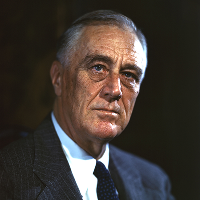Quotes By Franklin Roosevelt

Leader
Franklin Roosevelt
Jan 30, 1882 - Apr 12, 1945
The true conservative seeks to protect the system of private property and free enterprise by correcting such injustices and inequalities as arise from it.
The most serious threat to our institutions comes from those who refuse to face the need for change.
Liberalism becomes the protection for the far-sighted conservative.
Wise and prudent men - intelligent conservatives - have long known that in a changing world worthy institutions can be conserved only by adjusting them to the changing time.
I am that kind of conservative because I am that kind of liberal.
Envy, hatred and malice among Nations have reached their peak and will be succeeded by a new tide of peace and good-will.
We are not isolationists except in so far as we seek to isolate ourselves completely from war.
So long as war exists on earth there will be some danger that even the Nation which most ardently desires peace may be drawn into war.
I wish I could keep war from all Nations; but that is beyond my power. I can at least make certain that no act of the United States helps to produce or to promote war.
The conscience of America revolts against war and that any Nation which provokes war forfeits the sympathy of the people of the United States.
A dark old world was devastated by wars between conflicting religions. A dark modern world faces wars between conflicting economic and political fanaticisms in which are intertwined race hatreds.
It was natural and perhaps human that the privileged princes of these new economic dynasties, thirsting for power, reached out for control over government itself. They created a new despotism and wrapped it in the robes of legal sanction.
The average man once more confronts the problem that faced the Minute Man.
The hours men and women worked, the wages they received, the conditions of their labor - these had passed beyond the control of the people, and were imposed by this new industrial dictatorship.
The savings of the average family, the capital of the small-businessmen, the investments set aside for old age - other people's money - these were tools which the new economic royalty used to dig itself in.
Those who tilled the soil no longer reaped the rewards which were their right. The small measure of their gains was decreed by men in distant cities.
Throughout the nation, opportunity was limited by monopoly. Individual initiative was crushed in the cogs of a great machine.
Private enterprise, indeed, became too private. It became privileged enterprise, not free enterprise.
For too many of us the political equality we once had won was meaningless in the face of economic inequality.
A small group had concentrated into their own hands an almost complete control over other people's property, other people's money, other people's labor - other people's lives.
Popular Authors










